
Carex pilulifera, the pill sedge, is a European species of sedge found in acid heaths, woods and grassland from Macaronesia to Scandinavia. It grows up to 30 cm (12 in) tall, with 2–4 female spikes and 1 male spike in an inflorescence. These stalks bend as the seeds ripen, and the seeds are collected and dispersed by ants of the species Myrmica ruginodis.
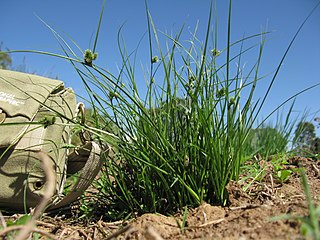
Carex inversa, commonly known as knob sedge, is a species of sedge of the family Cyperaceae that is native to parts of Australia and New Zealand and has also been introduced into Great Britain.

Carex pumila, commonly known as strand sedge or spreading sedge, is a species of sedge of the family Cyperaceae.

Carex brevior, known as shortbeak sedge and plains oval sedge, is a species of sedge native to North America. The specific epithet brevior means "shorter" in Latin.
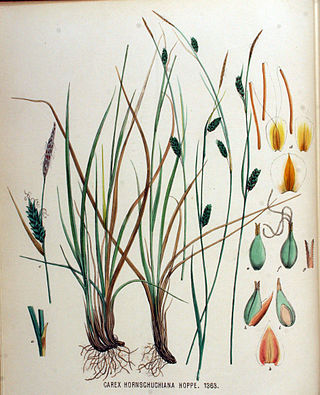
Carex hostiana, the tawny sedge, is a species of flowering plant in the genus Carex, native to Europe and northeast Canada, and extinct in Massachusetts. It is a member of the Carex flava species complex.
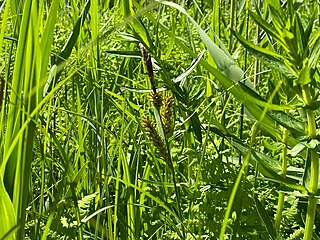
Carex rugulosa, also known as the thick-nerve sedge or the slender-culm thick-nerve sedge, is a tussock-forming perennial in the family Cyperaceae. It is native to eastern parts of Asia.
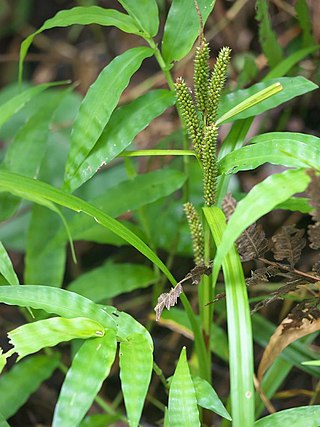
Carex alliiformis is a tussock-forming perennial sedge in the family Cyperaceae. It is native to eastern parts of Asia.

Carex breviscapa is a tussock-forming perennial in the family Cyperaceae. It is native to eastern parts of the south east Asia and north eastern Australia

Carex scaposa, also known as hua ting tai cao in Chinese, is a tussock-forming species of perennial sedge in the family Cyperaceae. It is native to eastern parts of Asia.

Carex cruenta is a tussock-forming species of perennial sedge in the family Cyperaceae. It is native to parts of Asia, from Pakistan in the west to south central parts of China in the east.
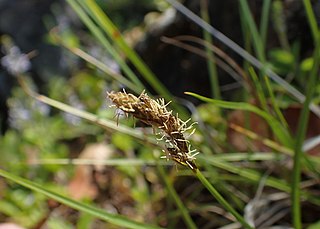
Carex haematostoma, also known as hong zui tai cao in China, is a tussock-forming species of perennial sedge in the family Cyperaceae. It is native to parts of central Asia and China.

Carex parva, also known to Chinese people as xiao tai cao, is a tussock-forming species of perennial sedge in the family Cyperaceae. It is native to parts of Asia from Afghanistan to Mongolia.
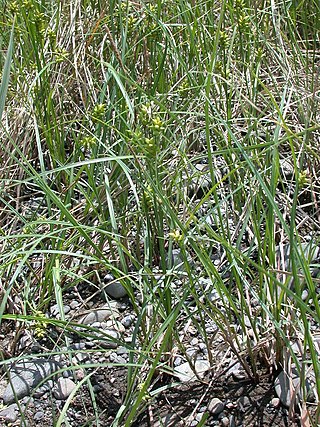
Carex scabrifolia, also known as cao ye tai cao, is a tussock-forming species of perennial sedge in the family Cyperaceae. It is native to eastern parts of Asia.

Carex gaudichaudiana, also known as fen sedge, is a tussock-forming species of perennial sedge in the family Cyperaceae. It is native to parts of Australia and New Zealand.
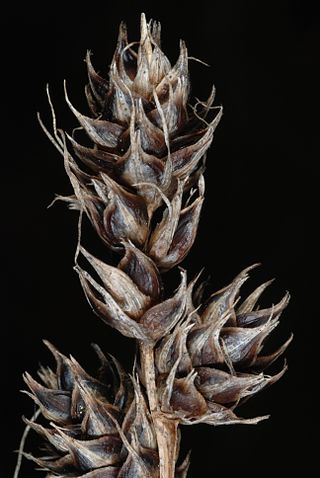
Carex gravida, also known as heavy-fruited sedge, heavy sedge or long-awned bracted sedge, is a tussock-forming species of perennial sedge in the family Cyperaceae. It is native to southern parts of Canada and parts of the United States.
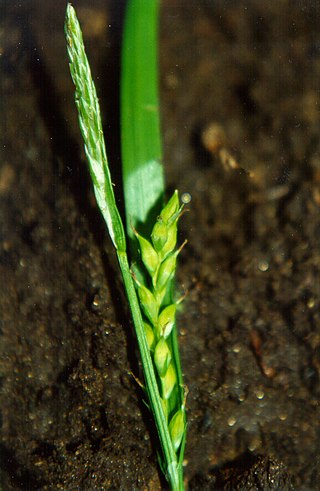
Carex hendersonii, also known as Henderson's sedge or carex de Henderson, is a tussock-forming species of perennial sedge in the family Cyperaceae. It is native to western parts of North America.

Carex michauxiana, also known as Michaux's sedge, carex de Michaux or yellowish sedge in Canada, is a tussock-forming species of perennial sedge in the family Cyperaceae. It is native to eastern parts of North America and parts of Asia.
Carex alsophila, commonly known as forest sedge, is a tussock-forming species of perennial sedge in the family Cyperaceae. It is native to Victoria in south eastern Australia.
Carex cephalotes, also known as wire-head sedge, is a tussock-forming species of perennial sedge in the family Cyperaceae. It is native to south eastern Australia and New Zealand.

Carex dickinsii, also known as Dickins' sedge or chao xian tai cao in pinyin, is a tussock-forming species of perennial sedge in the family Cyperaceae. It is native to parts of Japan, Taiwan and south-eastern China.

















